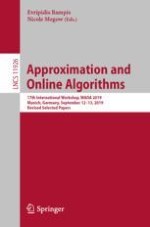This book constitutes the thoroughly refereed workshop post-proceedings of the 17th International Workshop on Approximation and Online Algorithms, WAOA 2019, held in Munich, Germany, in September 2019 as part of ALGO 2019.
The 16 revised full papers presented together with one invited paper in this book were carefully reviewed and selected from 38 submissions. Topics of interest for WAOA 2018 were: graph algorithms; inapproximability results; network design; packing and covering; paradigms for the design and analysis of approximation and online algorithms; parameterized complexity; scheduling problems; algorithmic game theory; algorithmic trading; coloring and partitioning; competitive analysis; computational advertising; computational finance; cuts and connectivity; geometric problems; mechanism design; resource augmentation; and real-world applications.
